A brutally poetic end to an election of hard narratives
On election night, the narrative gods switched the scripts—grief at Clinton HQ, dazed, frozen thrill at Trump’s
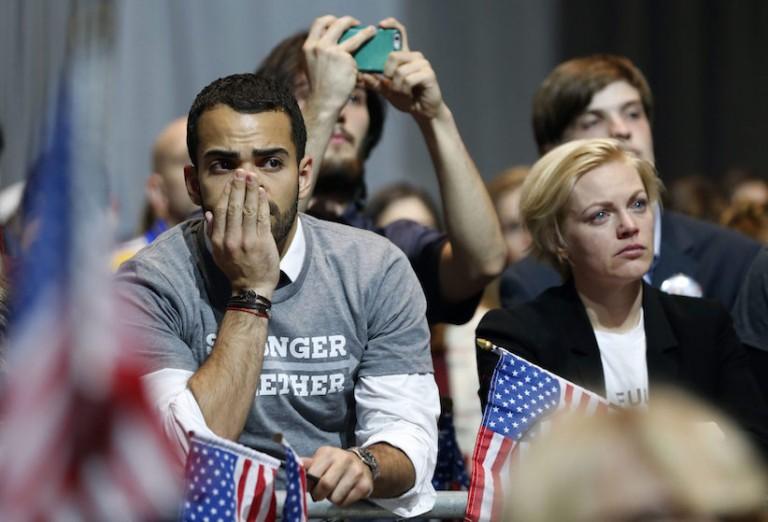
Hillary Clinton supporters react as results come in at an election night party for the Democratic presidential candidate at the Jacob K. Javits Convention Center in New York, late on Tuesday, Nov. 8, 2016. (Vernon Bryant/The Dallas Morning News via AP)
Share
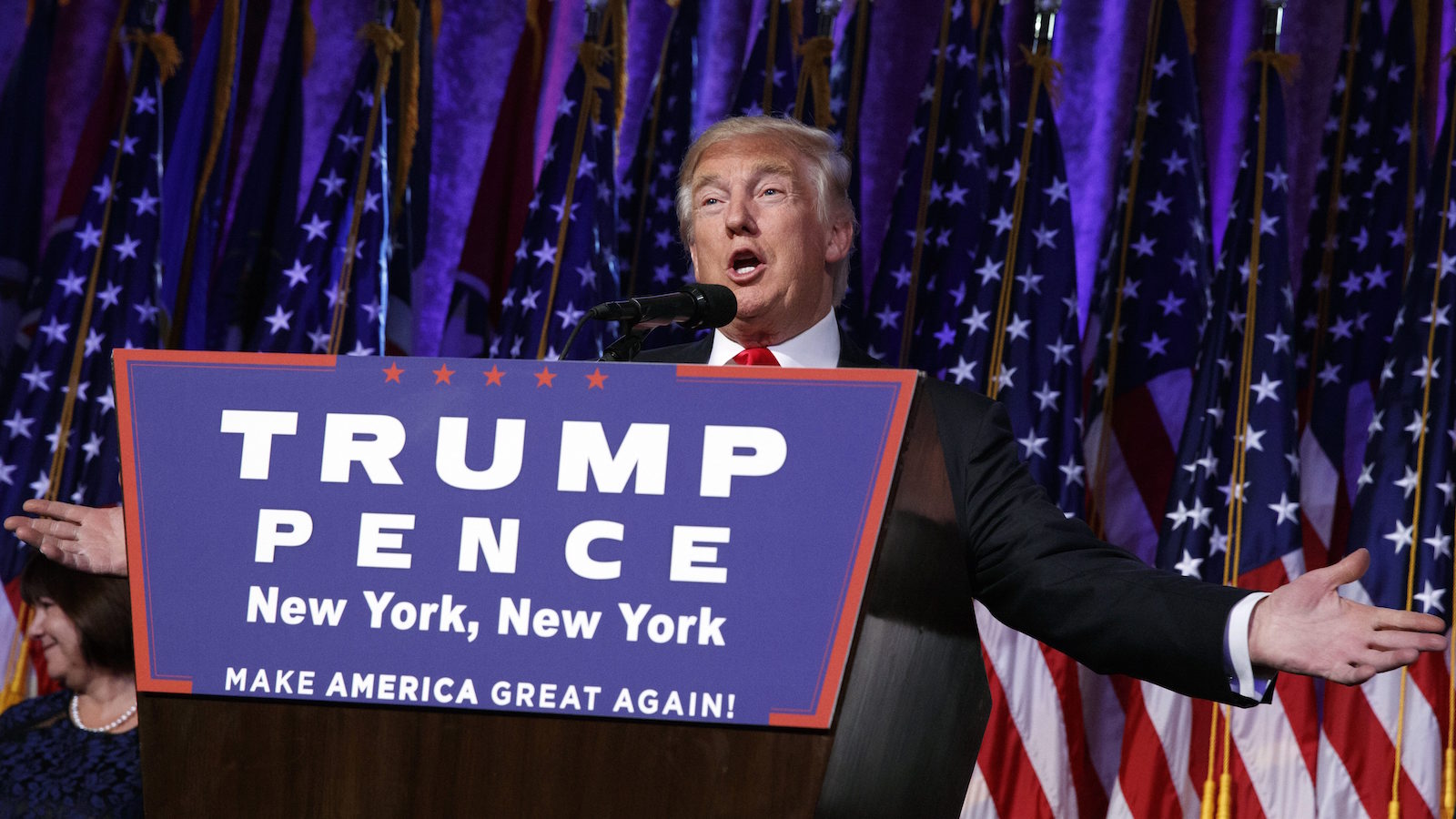
America’s election night, like the rest of the presidential campaign, turned out to be about who was supposed to feel gleeful, and who very unexpectedly ended up that way.
Losing Democratic candidate Hillary Clinton did not even appear at her campaign’s gathering at the Jacob Javits Convention Center in New York. Instead, her campaign chairman John Podesta appeared in her place, telling the crowd that it had been a long, long campaign and they could surely all wait a little longer while votes in close races were still being counted. Go home, get some sleep, we’ll talk tomorrow, he told Clinton’s supporters, in a carefully upbeat and in-control voice. “We are so proud of her!” Podesta declared, to the biggest cheers from a group that had already dwindled by its own heartbreak. “She has done an amazing job and she is not done yet!”
MORE: Trump wins an election that wasn’t about choices, after all
It wasn’t clear at the time whether Clinton and her team genuinely thought the race was still in play, or if she simply couldn’t bring herself to appear. But a short time later, she made a private concession call to Trump, and that cleared the way for the Republican nominee, his running-mate Mike Pence and their families to parade out onto a stage at the New York Hilton Midtown, where his supporters were riotously gathered. The victorious family parade was a curiously sedate affair: subdued but deeply satisfied-looking.
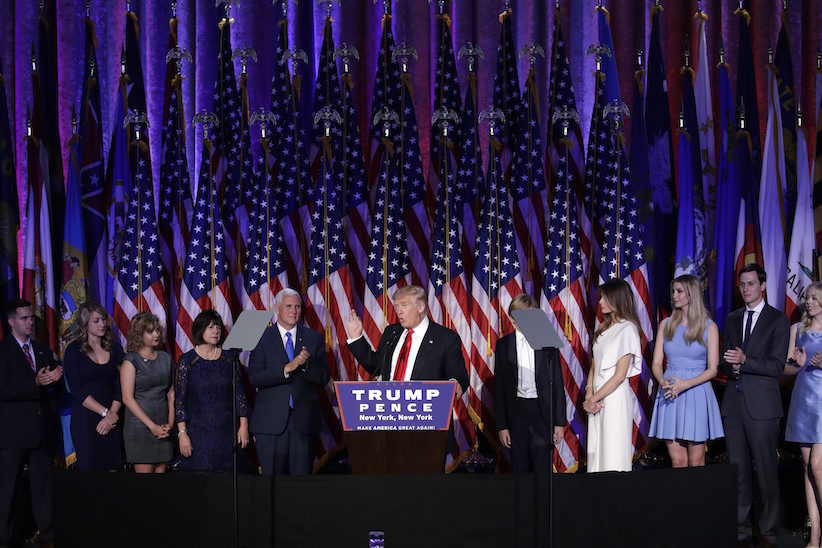
Then Trump began the acceptance speech that all the pundits agreed would have to be gracious and unifying. And if there was any thought he wrote it himself or free-wheeled much, it evaporated when he uttered the line, “Now it’s time for America to bind the wounds of division.” He praised Clinton for a well-run campaign, and spoke of bringing together Democrats and Republicans, being a friend to all nations—while still putting American interests first—and being a President of whom voters would be proud. “I pledge to all the citizens of our land that I will be president to all Americans,” he said, tacking on the Trump-ish ad-lib, “And this is so important to me.”
Trump thanked his family members by name for all the hours they put into a tough campaign, and then ran through a strangely informal and fratty list of thank-yous and shout-outs to surrogates and former adversaries like Chris Christie, Rudy Giuliani and Reince Priebus. “Ours was not a campaign, but rather an incredible and great movement,” he intoned, using the same tranquilized voice he’d employed in the debates. Trump received one of his biggest cheers when he pledged that the forgotten people of America would be forgotten no more. “We must reclaim our country’s destiny and dream big and bold and daring,” he said.
It was a stark flip in tone from where the two campaigns were earlier, when the first returns started rolling in.
The mood then seemed cautiously buoyant at the Clinton party and clenched and nihilistic at Trump headquarters. The Republican candidate’s campaign sounded all but resigned to the outcome that virtually every pollster and analyst predicted in the last few weeks; one Republican operative texted a CNN correspondent, “It’ll take a miracle for us to win.”
But then, over the next few hours, results poured in and things took a hard and unexpected turn toward the promised restoration of greatness. It wasn’t the landslide repudiation of Trump and everything he stands for that some had predicted, and it wasn’t even the solid, serviceable Clinton victory that many models foresaw. And so, you had Trump’s going-through-the-motions election night party suddenly electrified by an impending victory that had to catch everyone from the candidate on down—notwithstanding a tendency to be braggadocious—by total surprise. Suddenly, there was a red trucker cap on every head in the room.
And the Clinton gathering that was supposed to be a victory party celebrating so much more than a single candidate in a given year turned into a sudden-death funeral. People stood with their hands clapped over their horrified mouths, trying to process the numbers marching impassively across TV screens, while others wept openly or simply slunk home to lick their wounds.
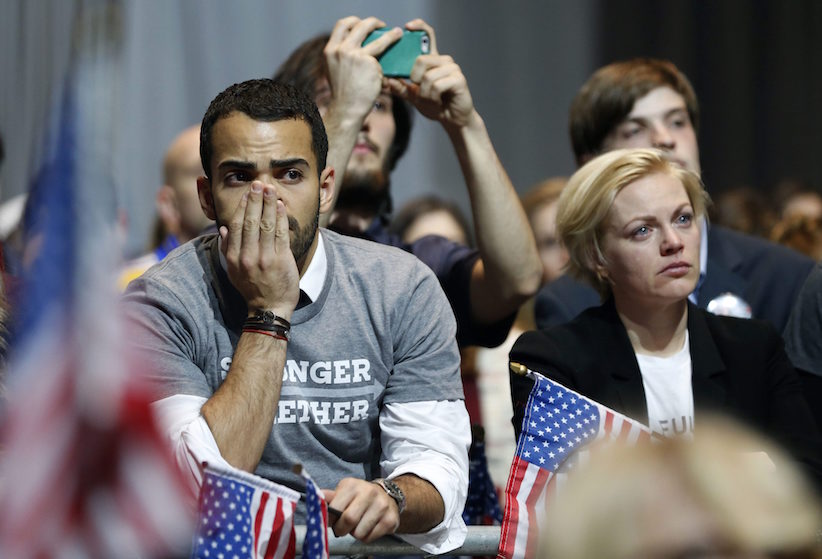
It wasn’t supposed to be like this. But really, given the way this campaign has unfolded, if you’re someone with an eye for poetic narratives, this was a brutally appropriate ending.
There should have been so much misty-eyed joy in this race. The first woman was within reach of the White House, the loftiest of glass ceilings there just begging to be shattered, at last. That she followed America’s first black president, Barack Obama, only added to the feeling that this was an extended chapter in redrawing who was allowed into the halls of power. People pointed out that an entire generation of kids would come of age never having known the standard-issue old white dude occupying the Oval Office.
It should have been jubilation, a moment to marvel at how far things have come for women. But instead, thanks largely to the toxicity of Trump and the Pepe the Frog-worshipping hate-brigade he emboldened, the campaign was a sewage pipe of reminders that for certain types, women exist only as their constituent body parts. They should be seen and not heard—but only if they’re deemed attractive enough to be seen (or assaulted)—and they will be made to pay if they dare to raise their voices or their hands for a certain type of ambition.
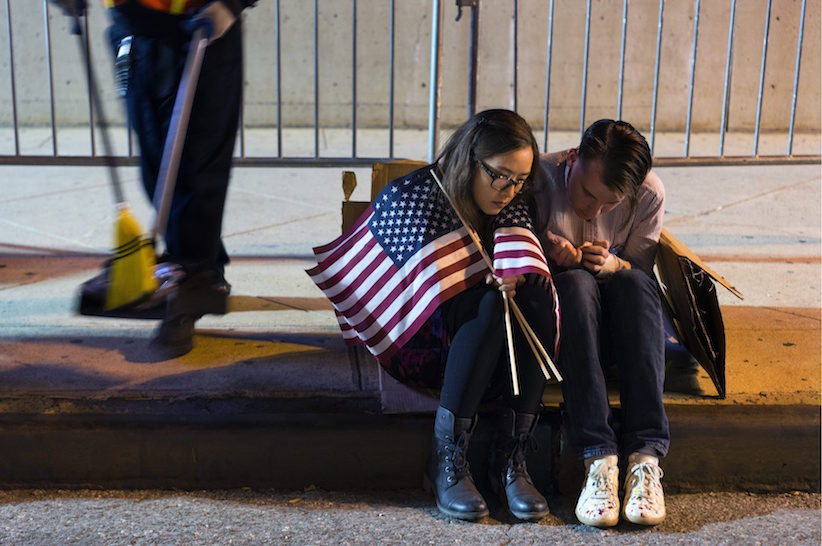
And so the election campaign that should have been about gratitude, celebration and excitement over the come-to-life promise of Rosie the Riveter instead became a dark demonstration of the reality that the higher some women climb, the more viciously others will be clawed back down, pawed at or pinned to an impossible standard and declared wanting. Samantha Bee, as usual, put it best: “None of us has gotten to savour this historic election like we should,” she said. “It’s been like running a marathon while a bear is chasing you—we might be really proud, but it kind of gets lost in all the mortal terror.”
There were, to be sure, brief little gasps of the joy that should have accompanied Clinton’s historic candidacy, regardless of the ultimate result. Mount Hope Cemetery in Rochester, N.Y. extended its visiting hours to accommodate the throngs lining up to add their “I voted” stickers to the headstone of suffragist Susan B. Anthony. The Washington Post published a sensitive and soaring portrait of the life and times of Gladys Ament, who was born on the day women were finally given the right to vote, and would now get a chance to mark her ballot for one of her own. There was even Kate McKinnon’s Hillary on Saturday Night Live, shimmying and cackling “I think I’m going to be President” after Trump self-immolated in the debates.
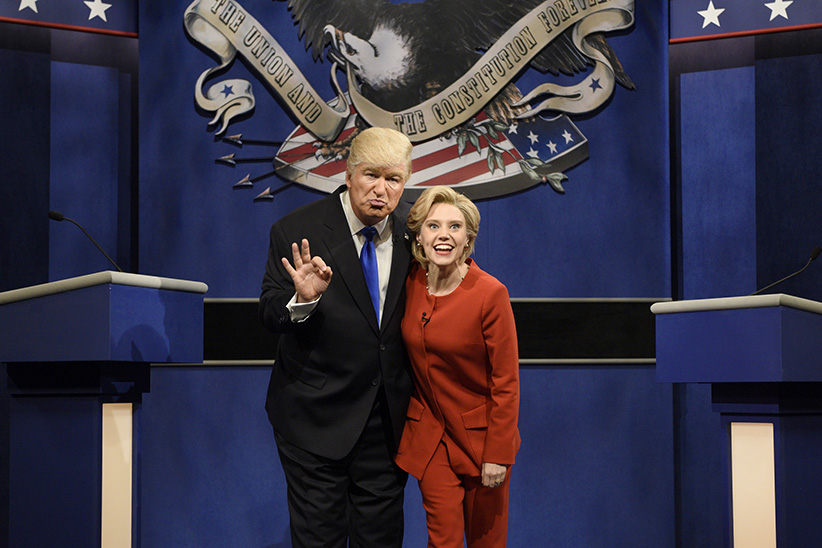
But those moments were rare deep breaths in an otherwise grim, suffocating, greenish-tinged campaign. That sickly quality was further highlighted by the fact that Trump & Co. seemed to capture a sort of manic glee in his campaign. Sure, it was in the manner of a Viking horde laying waste to a shell-shocked village, but there was an unmistakable, savagely romping mood to his campaign—at least until the last week or two.
On election night, it seemed possible that the missing buoyancy that should have accompanied Clinton’s candidacy all along would burst forth and coalesce in an even bigger way than it did the night she accepted the Democratic nomination. But once again, the gods of narrative flipped the script, and so instead it was bombed-out grief and misery at Clinton HQ—and a sort of dazed, frozen thrill at the Trump party.
At the conclusion of his acceptance speech, Trump said that though the long and gruelling campaign was over, the work on their movement was only now beginning. “I look very much forward to being your president,” he said. “And hopefully at the end of two years or three years or four years—or maybe even eight years—you will say that was something you were really very proud to do.”
And then—honest to God—he and his family exited the stage to the Rolling Stones’ “You Can’t Always Get What You Want.” So this all came to an end with a laugh of some sort, at least.